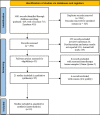Clinicopathological differences of high Fusobacterium nucleatum levels in colorectal cancer: A review and meta-analysis
- PMID: 36406461
- PMCID: PMC9672069
- DOI: 10.3389/fmicb.2022.945463
Clinicopathological differences of high Fusobacterium nucleatum levels in colorectal cancer: A review and meta-analysis
Abstract
Objective: To systematically evaluate the significance of Fusobacterium nucleatum (Fn) levels the clinicopathological impacts of cancer.
Methods: Literature from Pubmed, Embase, and Web of Science was retrieved to collect all English literatures on the correlation between Fn and cancer, and the quality of literatures collected was assessed based on the Newcastle-Ottawa Quality Assessment Scale. The heterogeneity and sensitivity were detected by Stata 14.0 software, and the correlation between Fn and cancer clinicopathological as the effect variables was assessed according to the odds ratio (OR) and 95% confidence interval (CI). The forest plot was drawn.
Results: A total of 19 articles meeting the inclusion criteria were selected. The incidence of Fn prevalence varied considerably (range: 6.1 to 83.3%) and was greater than 10% in 13 of 19 studies. Compared with those with no/low Fn levels, the high levels of Fn was positively associated with vascular invasion, nerve invasion, depth of invasion, and distant metastasis [vascular invasion: OR = 1.66, 95%CI(1.07, 2.57), I 2 = 21.9%, fixed effect model; nerve invasion: OR = 1.36, 95%CI(1.00, 1.84), I 2 = 43.1%, fixed effect model; infiltration depth: OR = 1.94, 95%CI(1.20, 3.15), I 2 = 67.2%, random effect model; distant metastasis: OR = 1.80, 95%CI(1.23, 2.64), I 2 = 3.4%, fixed effect model]. Patients with MLH1 methylation always present a higher Fn levels than those without methylation [OR = 2.53, 95%CI(1.42, 4.53), P = 0.01, I 2 = 57.5%, random effect model]. Further, Fn was associatedwith the molecular characteristics of cancers [MSI-H Vs. MSS/MSI-low: OR = 2.92, 95%CI(1.61, 5.32), P = 0.01, I 2 = 63.2%, random effect model; High Vs. Low/Negative CIMP: OR = 2.23, 95%CI(1.64, 3.03), P = 0.01, I 2 = 64.2%, random effect model; KRAS mutation Vs. wild-type: OR = 1.24, 95%CI(1.04, 1.48), P = 0.02, I 2 = 27.0%, fixed effect model; Present Vs. Abscent BRAF mutations: OR = 1.88, 95%CI(1.44, 2.45), P = 0.01, I 2 = 24.2%, fixed effect model]. The cancer patients with high levels of Fn often have worse RFS than those with no/low Fn levels[OR = 1.14, 95%CI(0.61, 1.68), P = 0.01, I 2 = 80.7%, random effect model].
Conclusion: This review and meta-analysis showed that Fn could be used to predict unfavorable prognosis and function as potential prognostic biomarkers in colorectal cancer (CRC). Our data may have implications for targeting Fn to develop strategies for cancer prevention and treatment.
Keywords: Fusobacterium nucleatum; cancer; colorectal cancer; meta-analysis; review.
Copyright © 2022 Wang, Wen, Wang, Lai, Xu, Zhang, Zhu, Ruan and Huang.
Conflict of interest statement
The authors declare that the research was conducted in the absence of any commercial or financial relationships that could be construed as a potential conflict of interest.
Figures











References
-
- Casasanta M. A., Yoo C. C., Udayasuryan B., Sanders B. E., Umaña A., Zhang Y., et al. (2020). Fusobacterium nucleatum host-cell binding and invasion induces IL-8 and CXCL1 secretion that drives colorectal cancer cell migration. Sci. Signal. 13:eaba9157. doi: 10.1126/scisignal.aba9157, PMID: - DOI - PMC - PubMed
Publication types
LinkOut - more resources
Full Text Sources
Research Materials
Miscellaneous

